March 22, 2018 •
House Spending Bill Includes Campaign Finance Provisions
Among the provisions in the 2,232-page federal 2018 spending bill passed by the U.S. House today were sections affecting campaign finance. One provision of the bill prohibits the Internal Revenue Service from issuing, revising, or finalizing any regulation, revenue ruling, […]
 Among the provisions in the 2,232-page federal 2018 spending bill passed by the U.S. House today were sections affecting campaign finance.
Among the provisions in the 2,232-page federal 2018 spending bill passed by the U.S. House today were sections affecting campaign finance.
One provision of the bill prohibits the Internal Revenue Service from issuing, revising, or finalizing any regulation, revenue ruling, or other guidance relating to the standard used to determine whether an organization is operated exclusively for the promotion of social welfare for purposes of section 501(c)(4) of the Internal Revenue Code of 1986.
The prohibition includes not implementing proposed regulations from 2013 that sought to provide guidance to tax-exempt social welfare organizations concerning political activities related to candidates that would not be considered to promote social welfare.
Additionally, the bill prohibits the executive branch from requesting “a determination with respect to the treatment” of a tax-exempt 501(c) organization.
Another provision of the bill prohibits the federal government from recommending or requiring any entity submitting an offer for a federal contract to disclose, as a condition of submitting the offer, any payment consisting of a contribution, expenditure, independent expenditure, or disbursement for an electioneering communication made by the entity, its officers or directors, or any of its affiliates or subsidiaries to federal candidates and political committee.
March 22, 2018 •
Walker Must Call Special Elections to Fill Legislative Vacancies
Dane County Circuit Judge Josann Reynolds ruled Wisconsin Gov. Scott Walker must call special elections to fill legislative vacancies. Two seats were left vacant in December when Republican lawmakers resigned to work in Walker’s administration. Reynolds, whom Walker appointed in […]
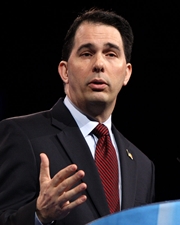 Dane County Circuit Judge Josann Reynolds ruled Wisconsin Gov. Scott Walker must call special elections to fill legislative vacancies.
Dane County Circuit Judge Josann Reynolds ruled Wisconsin Gov. Scott Walker must call special elections to fill legislative vacancies.
Two seats were left vacant in December when Republican lawmakers resigned to work in Walker’s administration.
Reynolds, whom Walker appointed in 2014, found he has a duty to call the elections; failure to do so would infringe on the voting rights of the districts’ residents.
He must issue an order by March 29 calling elections within the next 11 weeks.
March 22, 2018 •
North Dakota Government Ethics Petition Approved
North Dakota Secretary of State Al Jaeger approved the format of a petition to amend the state constitution to include an independent ethics commission. If voters approve, the ethics commission would be responsible for adopting rules related to elections, lobbying, […]
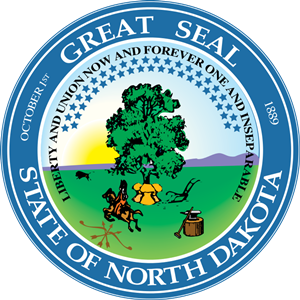 North Dakota Secretary of State Al Jaeger approved the format of a petition to amend the state constitution to include an independent ethics commission.
North Dakota Secretary of State Al Jaeger approved the format of a petition to amend the state constitution to include an independent ethics commission.
If voters approve, the ethics commission would be responsible for adopting rules related to elections, lobbying, and for reporting and investigating alleged violations of those rules and related state laws.
Additionally, the measure prohibits gifts from lobbyists, prohibits the delivery of campaign contributions by lobbyists, restricts lobbying from former public officials, and restricts the use of campaign contributions, among other provisions.
Supporters of the petition have until July 9 to gather nearly 27,000 signatures to place the constitutional amendment on the November ballot.
Have you assessed the health and overall risks in your company’s government affairs compliance program? Reputation is your company’s most valued asset. A strong compliance program will help your company remain qualified for future contract opportunities and will save your […]
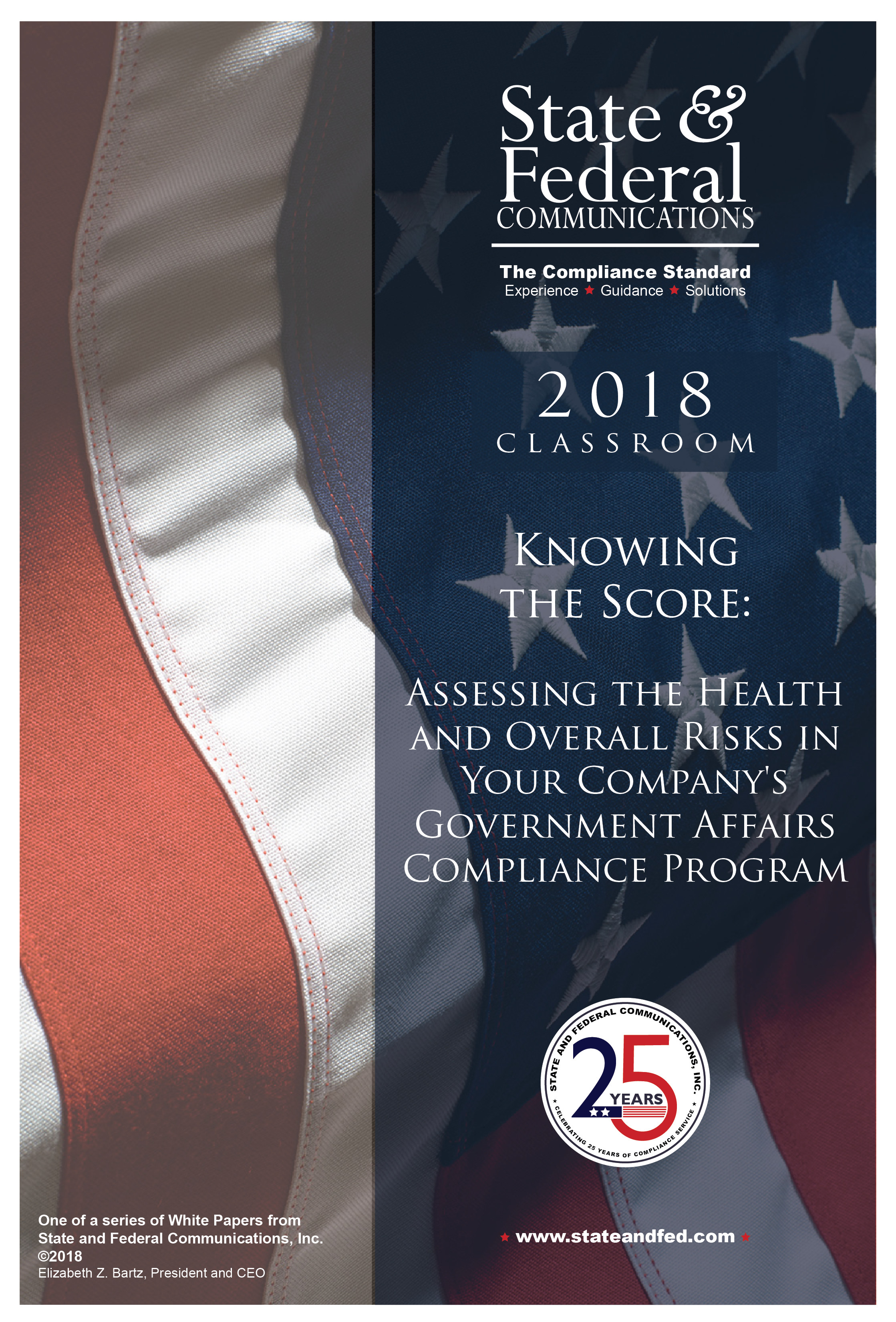 Have you assessed the health and overall risks in your company’s government affairs compliance program?
Have you assessed the health and overall risks in your company’s government affairs compliance program?
Reputation is your company’s most valued asset.
A strong compliance program will help your company remain qualified for future contract opportunities and will save your brand reputation.
State and Federal Communications is here to help you. Our newest white paper “Corporate Compliance and Knowing the Score: Assessing the Health and Overall Risks in Your Company’s Government Affairs Compliance Program” will inform you on important elements and characteristics of an effective compliance program and tips to audit the effectiveness of your government affairs program.
This new white paper will provide you with the key information to keep in mind as you continue your government affairs program.
Click here to get this FREE white paper today – and ensure you and your team can say “I Comply!”
March 21, 2018 •
Washington Passes Law Requiring Disclosure from Nonprofits Engaged in Political Campaigns
Washington Governor Jay Inslee signed into law the DISCLOSE Act, a law requiring certain nonprofit organizations to file organizational statements and periodic disclosure statements with the Public Disclosure Commission. Under the new law, these organizations will be required to disclose […]
 Washington Governor Jay Inslee signed into law the DISCLOSE Act, a law requiring certain nonprofit organizations to file organizational statements and periodic disclosure statements with the Public Disclosure Commission.
Washington Governor Jay Inslee signed into law the DISCLOSE Act, a law requiring certain nonprofit organizations to file organizational statements and periodic disclosure statements with the Public Disclosure Commission.
Under the new law, these organizations will be required to disclose the top 10 donors whose contributions aggregate to $10,000 or more in the calendar year if the nonprofit expects to make contributions or expenditures that aggregate to at least $25,000 in any calendar year in Washington state election campaigns, including ballot initiatives.
The DISCLOSE Act goes into effect on January 1, 2019.
March 21, 2018 •
Indiana Special Session Likely to be Called
On March 14, the second regular session of the 120th Indiana General Assembly adjourned with several bills pending on the floor. As a result, Gov. Eric Holcomb plans to call a special session for May. On top of the Holcomb’s […]
 On March 14, the second regular session of the 120th Indiana General Assembly adjourned with several bills pending on the floor.
On March 14, the second regular session of the 120th Indiana General Assembly adjourned with several bills pending on the floor.
As a result, Gov. Eric Holcomb plans to call a special session for May. On top of the Holcomb’s list is a school safety spending bill and a bill needed to harmonize state tax code with federal tax code.
Holcomb plans to set an agenda with Republican legislators before he officially calls a special session.
Gov. Gary Herbert signed House Bill 320 this week, putting it into effect immediately. The bill expands the existing prohibition on contributions to legislators during a legislative session to also cover contributions to the lieutenant governor, attorney general, state auditor, […]
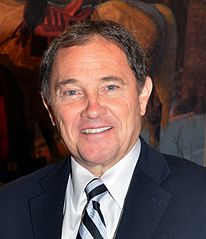 Gov. Gary Herbert signed House Bill 320 this week, putting it into effect immediately.
Gov. Gary Herbert signed House Bill 320 this week, putting it into effect immediately.
The bill expands the existing prohibition on contributions to legislators during a legislative session to also cover contributions to the lieutenant governor, attorney general, state auditor, and state treasurer.
The prohibition extends to contributions to the personal campaign committees and political action committees (PACs) of the covered candidates. Previously, only contributions to legislators were banned during sessions.
Parties prohibited from contributing during session include persons, lobbyists, principals, and political committees.
March 21, 2018 •
Federal Court Finds FEC Decision Concerning Outside Political Activity of Group During 2010 Elections Inconsistent with Governing Statutes
On March 20, a federal court found the Federal Election Commission (FEC) failed to interpret campaign finance laws correctly as applied to an outside group’s political activity during the 2010 federal elections. In 2012, Citizens for Responsibility and Ethics in […]
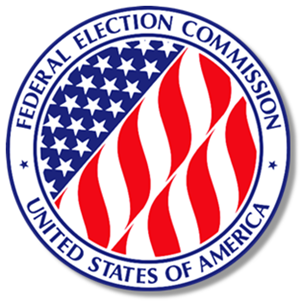 On March 20, a federal court found the Federal Election Commission (FEC) failed to interpret campaign finance laws correctly as applied to an outside group’s political activity during the 2010 federal elections.
On March 20, a federal court found the Federal Election Commission (FEC) failed to interpret campaign finance laws correctly as applied to an outside group’s political activity during the 2010 federal elections.
In 2012, Citizens for Responsibility and Ethics in Washington (CREW) had brought a complaint to the FEC alleging American Action Network (AAN), an outside nonprofit entity that ran nearly $18 million in television advertisements just before the 2010 federal midterm elections, was a “political committee” and subject to federal disclosure requirements.
A majority of the commissioners did not find “reason to believe” that AAN violated any law and the complaint was dismissed. Crew appealed the FEC decision to the United States District Court for The District of Columbia.
Yesterday, U.S. District Judge Christopher R. Cooper found the FEC’s analysis used to determine whether AAN was a political committee “was inconsistent with the governing statutes,” granted summary judgment in favor of CREW, and remanded the matter back to FEC to address CREW’s initial complaint again.
March 21, 2018 •
Florida Revolving Door Proposal One Step Closer to November Ballot
The Florida Constitution Revision Commission (CRC) is one step closer to placing an ethics proposal on the November ballot. Proposal 39, creating an extended waiting period for state and local officials seeking to lobby after leaving office, was approved as […]
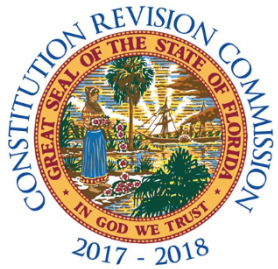 The Florida Constitution Revision Commission (CRC) is one step closer to placing an ethics proposal on the November ballot.
The Florida Constitution Revision Commission (CRC) is one step closer to placing an ethics proposal on the November ballot.
Proposal 39, creating an extended waiting period for state and local officials seeking to lobby after leaving office, was approved as amended.
The proposal prohibits state and local officials from lobbying their former departments, agencies, or governing bodies for six years after leaving office. Such persons would also be prohibited from lobbying any federal agency or any state or local body or agency during their respective terms of office.
Upon approval, the measure advanced, along with seven other proposals, to the Style and Drafting Committee. The committee has the authority to revise and combine proposals prior to a final vote by the full commission.
To be placed on the November 6 ballot, the proposal will need support from at least 22 commission members.
The Maryland House of Delegates unanimously voted on Monday to strengthen the General Assembly’s sexual harassment policies to cover lobbyists. The bill authorizes a person to file a complaint with the State Ethics Commission against a regulated lobbyist who has […]
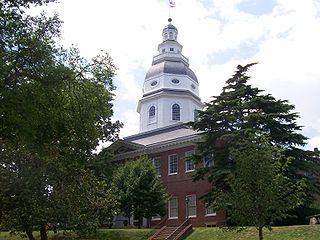 The Maryland House of Delegates unanimously voted on Monday to strengthen the General Assembly’s sexual harassment policies to cover lobbyists.
The Maryland House of Delegates unanimously voted on Monday to strengthen the General Assembly’s sexual harassment policies to cover lobbyists.
The bill authorizes a person to file a complaint with the State Ethics Commission against a regulated lobbyist who has sexually harassed a member or employee of the General Assembly, and it also allows a lobbyist to file a complaint against a member of the General Assembly for sexual harassment.
The bill has been referred to the Senate Rules Committee.
An ad-hoc committee led by members of the Monterey County Board of Supervisors is starting a series of invitation-only meetings to discuss campaign finance reforms aimed at establishing contribution limits or a spending cap for all county elected officials. The […]
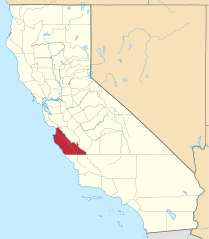 An ad-hoc committee led by members of the Monterey County Board of Supervisors is starting a series of invitation-only meetings to discuss campaign finance reforms aimed at establishing contribution limits or a spending cap for all county elected officials.
An ad-hoc committee led by members of the Monterey County Board of Supervisors is starting a series of invitation-only meetings to discuss campaign finance reforms aimed at establishing contribution limits or a spending cap for all county elected officials.
The goal of the meetings is to produce a recommendation for the full Board of Supervisors by the end of June and adopt limits in time for them to take effect January 1, 2019.
March 19, 2018 •
Carroll County, Maryland Passes Ethics Ordinance
The Board of Commissioners adopted a county ethics ordinance requiring additional disclosures from county candidates, elected officials, and certain county employees. The ordinance requires candidates, elected officials, and certain county employees to disclose interests in real property and in corporations. […]
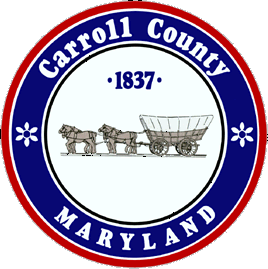 The Board of Commissioners adopted a county ethics ordinance requiring additional disclosures from county candidates, elected officials, and certain county employees.
The Board of Commissioners adopted a county ethics ordinance requiring additional disclosures from county candidates, elected officials, and certain county employees.
The ordinance requires candidates, elected officials, and certain county employees to disclose interests in real property and in corporations.
Additionally, the ordinance amends lobbyist reporting from monthly to bi-annual reporting.
The ethics ordinance was needed to bring Carroll County in compliance with state ethics requirements.
March 19, 2018 •
Special Election Called for Iowa Senate District 25
Gov. Kim Reynolds called a special election for Senate District 25. The special election has been called to fill the vacancy left by the resignation of State Sen. Bill Dix. Dix resigned after videos of the married lawmaker kissing a […]
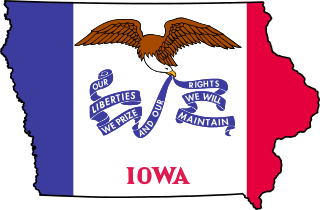 Gov. Kim Reynolds called a special election for Senate District 25.
Gov. Kim Reynolds called a special election for Senate District 25.
The special election has been called to fill the vacancy left by the resignation of State Sen. Bill Dix.
Dix resigned after videos of the married lawmaker kissing a lobbyist were posted online.
Reynolds has set the special election for April 10, 2018.
Once every 20 years, the Florida Constitution Revision Commission (CRC) convenes for the purpose of reviewing the state’s Constitution and proposing changes for voter consideration. The CRC travels around the state for approximately one year to identify issues, perform research, […]
 Once every 20 years, the Florida Constitution Revision Commission (CRC) convenes for the purpose of reviewing the state’s Constitution and proposing changes for voter consideration. The CRC travels around the state for approximately one year to identify issues, perform research, and propose constitutional amendments.
Once every 20 years, the Florida Constitution Revision Commission (CRC) convenes for the purpose of reviewing the state’s Constitution and proposing changes for voter consideration. The CRC travels around the state for approximately one year to identify issues, perform research, and propose constitutional amendments.
This year, the CRC is considering 37 amendments, including one related to ethics reform. The proposal, known as P-39, establishes a revolving door provision prohibiting lawmakers from lobbying local, state, and federal officials during their terms of office and prohibiting them from lobbying the Legislature and state agencies for six years after leaving office.
Similar waiting periods would apply to appointed officials as well as officials locally elected. Current law imposes a two-year waiting period and applies only to legislators and state officers or employees.
P-39 will be considered by the full CRC this week.
State and Federal Communications, Inc. provides research and consulting services for government relations professionals on lobbying laws, procurement lobbying laws, political contribution laws in the United States and Canada. Learn more by visiting stateandfed.com.

